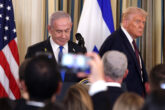October 27, 2017
Putting Peace Out of Reach
Despite the past week of violence that rocked Afghanistan, including a wave of major Taliban attacks on Afghan security forces, the Trump administration appears to still be holding the door open for a negotiated settlement. The commander of U.S. forces in Afghanistan, Gen. John W. Nicholson, recently credited President Donald Trump's commitment to an enhanced and open-ended military presence in Afghanistan with setting the conditions for a peaceful resolution of the conflict. And in his first trip to the region, Secretary of State Rex Tillerson reaffirmed the United States would fight the Taliban and pursue "a reconciliation process leading to a peace process and [the Taliban's] full involvement and participation in government."
If this is the case, then the administration's impending decision – as reported this week – to shutter the Taliban's political office in Doha, Qatar is misguided at best.
There are several possible rationales for closing the office. One is that the political office gives the Taliban unfounded legitimacy and allows it to conspire with other regional actors. Likewise, it is possible that U.S. and Afghan officials who believe negotiation should begin after the Taliban is weakened militarily see the office as a hindrance. Or perhaps there is simply a sense that "there was little evidence that the office had influence" with the Taliban leadership and, with U.S. forces staying in Afghanistan indefinitely, the office no longer has much utility. Even if all these reasons were sound, they are simply not good enough to countenance the decision.
Read the full op-ed in U.S. News and World Report.
More from CNAS
-
Transatlantic Security / Middle East Security
The Russia-Iran Partnership: A Geopolitical Balancing ActIt has been almost a year since Russia and Iran signed their comprehensive strategic partnership. That deal established a 20-year partnership between the two countries coverin...
By Andrea Kendall-Taylor & Jim Townsend
-
Transatlantic Security / Middle East Security / Energy, Economics & Security
Sanctions Aren’t Enough to Shut Down the Moscow-Tehran Black Market for WarThe geographic scope and extent of Iranian-Russian cooperation highlights the failure of traditional sanctions to prevent Moscow and Tehran from seeking key components like ch...
By Delaney Soliday
-
How a Peace Deal Between Hamas and Israel Will Reshape the Middle East
Rachel Brandenberg joins NPR to discuss how the region will change if Israel and Hamas continue to abide by the peace deal President Trump brokered. Listen to the interview o...
By Rachel Brandenburg
-
Donald Trump’s Gaza Plan Skips Step One
The White House proposal attempts to solve too many distinct issues all at once, without enough input from Palestinians....
By Delaney Soliday




